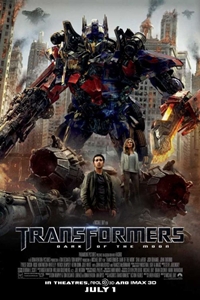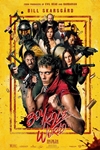Transformers: Dark of the Moon (PG-13) ★★★½
 If Transformers: Dark of the Moon is indeed Michael Bay's final entry in the Hasbro toy-inspired franchise, as he has repeatedly intimated, then it is a fitting swan song for a director whose lust - and gift - for spectacle remains unmatched. Exhilarating and exasperating, awe-inspiring and stupefying, the third installment in the blockbuster alien-robot saga is less a movie than a prolonged manic episode. In other words, it's a Michael Bay film.
If Transformers: Dark of the Moon is indeed Michael Bay's final entry in the Hasbro toy-inspired franchise, as he has repeatedly intimated, then it is a fitting swan song for a director whose lust - and gift - for spectacle remains unmatched. Exhilarating and exasperating, awe-inspiring and stupefying, the third installment in the blockbuster alien-robot saga is less a movie than a prolonged manic episode. In other words, it's a Michael Bay film.
Any suspicion that Bay might have matured at all since his last film, 2009's Transformers: Revenge of the Fallen, vanishes immediately after Dark of the Moon's opening credits, when model-actress (in that order) Rosie Huntington-Whiteley, replacing tempestuous Megan Fox as the franchise's resident eye candy, is introduced ass-first. The camera lingers on her backside, mesmerized, as she makes her way up the stairs to summon our hero, Sam Witwicky (Shia LaBeouf), from the bed she inexplicably shares with him. For a director so notoriously ADD-afflicted as Bay, he can show remarkable focus when circumstances require it.
Times are tough for our boy Sam, who, despite having saved the world on two separate occasions, can't find a job. With the Decepticon scourge abated (for now), Optimus Prime, Bumblebee, and the rest of Sam's Autobot pals have gotten side gigs as mechanized Hans Blixes, roaming the planet in search of illegal WMDs, and eliminating the regimes that harbor them. Feeling left out, and finding little comfort in the arms his undeservedly hot girlfriend, Sam yearns for a shot at more world-saving action.
He finds it soon enough when he is drafted into a plot so sprawling and convoluted that to describe it in full would extinguish what little neurochemical reserves I've managed to replenish since last night's screening. It's built on an enticing bit of revisionist history, which casts the war between the Autobots and Decepticons as the real inspiration for the Cold War space race. It seems that many years ago, an Autobot spacecraft, carrying a technology that could turn the tide in their centuries-long war, crash-landed on the moon. Alerted to the crash, JFK immediately initiated the Apollo program with the specific purpose of harvesting technology from the craft before the Soviets could.
But that's only part of the story, as Sam learns when confronted with evidence by a raving co-worker (Ken Jeong) at his new job. (The two have a tussle in the loo – setting the stage for a hi-larious gay-insinuation joke. Vintage Bay!) Turns out there there's much more to that fallen craft than anyone realizes, and if its undiscovered cargo falls into the wrong hands – say, Megatron and the Decepticons, who are quietly regrouping in Africa – the implications could be devastating.
Dark of the Moon can be roughly divided into two parts. The first is a conspiracy thriller with a surreal comic bent, with Bay aiming for – and dare I say, nearly achieving – a quirky Coen Brothers vibe as Sam delves headlong into the moon mystery. (The presence of Coen veterans Frances McDormand, John Turturro, and John Malkovich among the cast reinforces the connection.) Credit screenwriter Ehren Kruger for recognizing that material this preposterous requires a suitably ludicrous sense of humor. But there's also a sharpness and irreverence to Dark of the Moon's wit that previous Transformers films have lacked. (It's still, however, steadfastly juvenile: When Sam locks eyes with his future girlfriend for the first time, his mom exclaims "What a gorgeous box!" while gazing at an unrelated object in the background.) Dark of the Moon's screenplay is a vast improvement over Revenge of the Fallen's, in that it is an actual screenplay and not a stack of index cards.
The second half of the film, centering on the Decepticons' extended siege of Chicago, unfolds essentially in one long action sequence. It's as if Bay, having sufficiently answered the biggest complaint about the previous film – the lack of a discernible plot – is suddenly unburdened, free to commence the all-out sensory onslaught he's been planning all along. In doing so, he all but disavows the film's first half, rendering much of its storyline superfluous.
The battle scenes are truly epic – unprecedented in grandeur and scale, and utterly resplendent in 3D – but the endless spectacle induces a kind of delirium. Each frame is positively crammed with images, far more than our feeble non-Michael Bay brains could ever hope to process at the breakneck speed he presents them. And no two shots ever look the same: Even a simple shot-reverse-shot dialogue exchange shifts perspective on seemingly every other word. The net effect of Bay's frenzied handiwork is a state of joyful discombobulation: mouth agape, bewildered, basking in the dopamine blush.
Hollywood.com rated this film 3 1/2 stars.
To get the full Quicklook Films experience, uncheck "Enable on this Site" from Adblock Plus
box office top 10

Challengers Released: April 26, 2024 Cast: Zendaya, Josh O'Connor 15M

Unsung Hero Released: April 26, 2024 Cast: Daisy Betts, Joel Smallbone 7.8M

Godzilla x Kong: The New Empire Released: March 29, 2024 Cast: Rebecca Hall, Brian Tyree Henry 7.2M

Civil War Released: April 12, 2024 Cast: Kirsten Dunst, Wagner Moura 7M

Abigail Released: April 19, 2024 Cast: Melissa Barrera, Dan Stevens 5.3M

The Ministry of Ungentlemanly Warfare Released: April 19, 2024 Cast: Henry Cavill, Eiza Gonzalez 3.9M

Kung Fu Panda 4 Released: March 8, 2024 Cast: Jack Black, Viola Davis 3.6M

Ghostbusters: Frozen Empire Released: March 22, 2024 Cast: Paul Rudd, Carrie Coon 3.3M

Dune: Part Two Released: March 1, 2024 Cast: Timothée Chalamet, Zendaya 2M

Boy Kills World Released: April 26, 2024 Cast: Bill Skarsgård, Famke Janssen 1.7M






